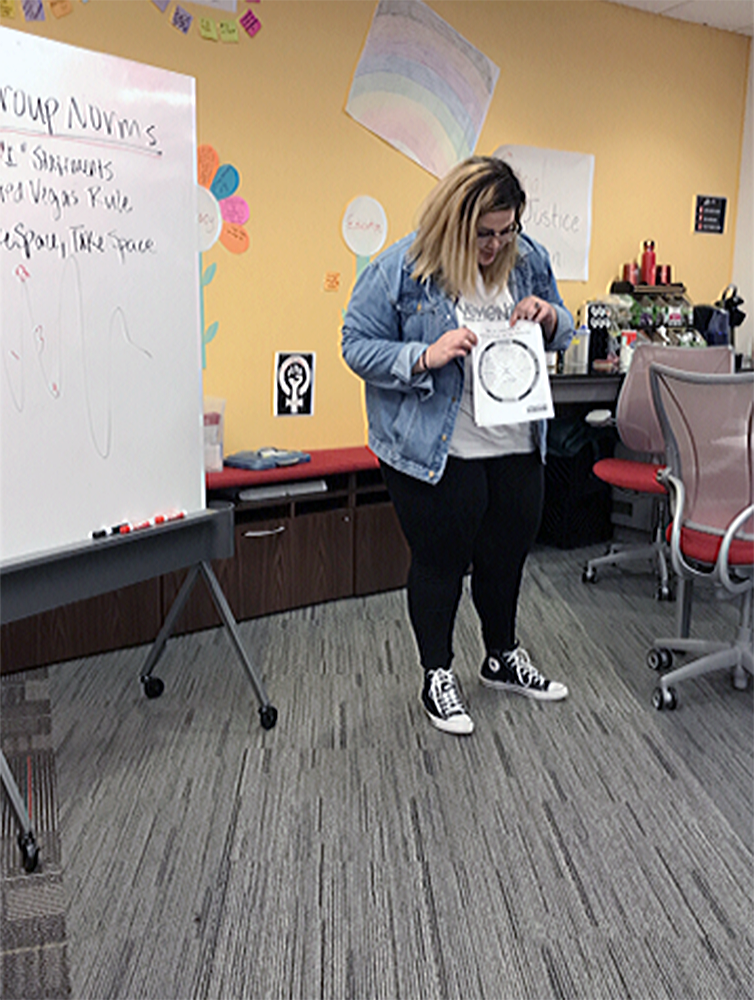While college is a stressful time all on its own, the undergraduate experience is further marked by new and evolving relationships, especially romantic relationships. As young adults, ensuring one’s relationship is a healthy one is vital in fostering positive individual growth. However, the line between what is a healthy and what is unhealthy behavior can seem blurry at times. How can college students recognize when a relationship is, or is becoming, unhealthy? The Women’s Center hosted “Healthy Relationships 101” on Tuesday evening to help identify key warning signs, on and off campus resources and how to support and empower loved ones in abusive relationships.
As January is Stalking Awareness Month, awareness of toxic relationships is a topic of interest to many. But, as college students, in a time when navigating the rocky waters of romantic relationships in the modern world can be difficult enough, recognizing warning signs of abuse and knowing the steps one can take to get help are important for more than just a mere four weeks.
It’s important to note that there’s more than just physical and emotional abuse when it comes to relationships. Abuse can take many forms, whether it be digital, financial, emotional/verbal, sexual and/or physical abuse, and stalking. All of these and more were discussed at Tuesday’s workshop, which aimed at increasing student awareness through interactive learning activities.
According to Loveisrespect, a project of the National Domestic Violence Hotline, 43 percent of college women report having experienced violent and abusive dating behaviors. Over half of students claim these behaviors are difficult to identify. Sara Forcella, the NC State Women’s Center’s rape prevention education coordinator and adviser of The Movement Peer Educators, explained critical warning signs of domestic violence that students should keep an eye out for.
“Some of the red flags that we tend to tell students to look for is any kind of really controlling behavior, so not letting you go out with your friends, or not letting you dress a certain way and extreme jealousy,” Forcella said. “Jealousy is a natural, human emotion, but any kind of extreme jealousy — sometimes that can be tied into a lack of trust — [such as] blaming you, or telling you that they know you’re cheating on them when you’re not.”
According to Forcella, domestic violence, also known as dating violence, occurs when a partner uses abuse to maintain power and control over someone. More obvious signs of abuse include any form of physical violence, as well as pressuring a partner into sexual contact while in a relationship.
“Just because you’re in a relationship doesn’t mean that sex or sexual contact is a guarantee or something that you need to give them,” Forcella said.
Understanding why one may choose to stay in an unhealthy relationship can be difficult. However, there are many reasons why this may be the case — often, it may be safer for someone to remain in an abusive relationship than to leave it. Forcella said that the first two weeks after one leaves an abusive relationship is the most dangerous time for them.
“I’m speaking from my own personal experience of seeing loved ones in that situation, and it can be very frustrating,” Forcella said. “From an outsider’s perspective, you can see the relationship is unhealthy, but maybe that person does not see it, or maybe they choose not to see it or maybe they don’t care that it’s unhealthy.”
As watching a loved one suffer from abuse of any kind can be extremely difficult, it is important to support and empower the individual to make their own decisions, as stripping them from that power can prove oppressive in and of itself. Educating oneself, and presenting information, on resources, while providing a non-judgmental ear to listen are two ways in which one can offer support for those in unhealthy relationships.
Kat Kirby, a third-year majoring in women’s and gender studies, who ran the “Healthy Relationships 101” workshop, initially got involved with the Women’s Center’s Feminist Fridays last year. After interning with InterAct, a nonprofit in Wake County that provides services to victims of domestic violence and sexual assault, Kirby was further inspired to enact change on campus.
“Often times when you come out of an abusive relationship you may not feel like you have a support system or like there’s no one there, which is not the case,” Kirby said. “There’s many resources on campus.”
Kirby noted open communication and trust as two of the keys to maintaining a healthy relationship. Thankfully, there are an influx of resources for students to utilize if in an abusive or unhealthy relationship of any kind. Specifically, the Women’s Center is a place that offers a supportive, inclusive environment for those seeking help, in whatever form that may be, an idea Kirby reinforced.
“We’re definitely a place where you can come, no matter your gender or orientation, no matter your identity, whatever that may be,” Kirby said.
The Women’s Center offers a 24/7 sexual assault helpline at (919) 515-4444, as well as the ability to work with students and their professors in providing reasonable accommodations. Additional sources include NC State University Police, which can be reached at 919-515-3000, and the Counseling Center, which offers confidential services to students. Further resources can be found on the Women’s Center’s website, https://oied.ncsu.edu/divweb/womenscenter/.













